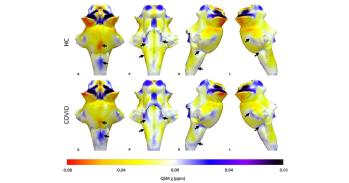
“Risk perception” among UK population greater than in nine other countries surveyed for latest research.
“Risk perception” among UK population greater than in nine other countries surveyed for latest research.
Appealing to prosocial motives can be an important part of solving social dilemmas during pandemics
Claudia Schneider
A new study of public attitudes across Europe, America and Asia has found that people in the UK have the highest overall levels of concern about coronavirus – more than Italy or Spain – while those in South Korea are the least concerned.
Researchers from the University of Cambridge conducted surveys on how people feel and think about the risk of the virus between mid-March and mid-April, across ten different countries with varying approaches to tackling the pandemic.
The study, co-authored by Dr Sarah Dryhurst and Dr Claudia Schneider from the Winton Centre for Risk and Evidence Communication, measured risk perception by combining people’s ratings of how prevalent, how life-threatening, and how worrying they thought the virus was.
The Cambridge team also set out to uncover some of the key psychological factors behind people’s concern. The findings, based on data from 6,991 participants, are published today in the Journal of Risk Research.
“Without pharmaceutical treatment, we are relying on people changing their behaviour to put the brakes on this pandemic,” said Dr Sander van der Linden, study lead and Director of the Cambridge Social Decision-Making Lab.
“The willingness to adopt protective behaviours such as frequent hand-washing or physical distancing is likely to be influenced, in part, by how risky people perceive the virus to be.”
“We think this is the first comparative evidence of how people perceive the risk of COVID-19 around the world,” he said.
In the study’s sample, Spain followed the UK for greatest public concern about coronavirus, with the US in third place. Although remaining differences were smaller, Germany came in fourth above Sweden – where the government has been less proscriptive about lockdowns – followed by Australia then Japan.
Perhaps surprisingly, Italy – the pandemic’s first European epicentre – ranked fairly low out of the ten nations, with only Mexico and South Korea having lower average risk perception scores.
However, there was little difference between many of the countries, with risk perception generally high in all nations.
The researchers also found that greater concern about the virus did indeed correlate with taking a number of preventative public health measures such as increased hand washing or wearing facemasks.
Men typically had lower levels of concern about the virus than women, despite the fact that, on average, COVID-19 appears to be considerably more dangerous to men if contracted.
The significance of different psychological factors varied between countries. However, some attitudes and traits consistently indicated increased perception of risk in people across several countries.
For example, across all nations, those who suspected they had already contracted the virus perceived a higher risk from it. In several countries, people who got information on the virus from friends or family also perceived higher risk.
“Prosociality”, or a belief in the importance of doing things for the benefit of others, related to heightened concern about the virus in nine of the ten countries. In fact, it emerged as one of the most important psychological factors of risk perception internationally.
“Appealing to prosocial motives can be an important part of solving social dilemmas during pandemics,” said Dr Claudia Schneider, co-author of the study. “For example, ‘clap for our carers’ campaigns help us to publicly signal prosocial intentions through shared sentiment and the spread of positive emotions.”
By contrast, what the researchers term an “individualistic worldview” – inferred from a belief that governments meddle too much in our lives – related to lower levels of concern about the risks of coronavirus.
While this worldview is famously associated with certain US states, it was also significantly related to risk perception in several other countries, such as Germany, Sweden, Spain, Japan and the UK.
“The perception that the government is restricting people’s freedom might cause psychological pushback among some people with strong individualistic worldviews,” said Dr Sarah Dryhurst, co-author of the study. “We see this expressed in anti-lockdown protests in the US and Germany, for example.”
Political ideology was less significant for risk perception overall, although a more conservative outlook was associated with lower levels of concern in the UK and the US.
“Governments are asking people to stay inside and give up their livelihoods in order to protect their societies. It’s important we understand how people react to the information and instructions they receive about the virus,” said Dr Alexandra Freeman, Director of the Winton Centre.
“We’ve made all our data publicly available to help institutions and journalists communicate better. We hope that this work can help the global effort to react appropriately to this threat,” she said.
Prof Sir David Spiegelhalter, co-author and Chairman of the Winton Centre, added: "As we move towards relaxing the lockdown, it is important to understand both the overall levels of concern, and the variability between people in their attitudes to the virus and the counter-measures taken. This evidence suggests that different worldviews need to be taken into account."
How you can support Cambridge's COVID-19 research effort

The text in this work is licensed under a Creative Commons Attribution 4.0 International License. Images, including our videos, are Copyright ©University of Cambridge and licensors/contributors as identified. All rights reserved. We make our image and video content available in a number of ways – as here, on our main website under its Terms and conditions, and on a range of channels including social media that permit your use and sharing of our content under their respective Terms.




